New Zealand’s fresh product industry and supply chain is valued at $14.7 billion, making it the eleventh-largest industry in NZ, says a new report by the industry.
Fresh produce is bigger than education and training, accommodation and food services and is comparable to health services, says the Produce Marketing Association (PMA) ANZ chief executive Darren Keating. He launched the report – a first for the industry – at the association’s HortConnections conference in Melbourne last week.
The report is aimed at understanding the size and scale of the fresh produce industry and the consumer trends likely to impact the industry in the future.
This is the first singling-out of the industry as an entity and the first time its size and scale have been measured in this way using industry indicators across Australia and NZ.
Growth in NZ has been relatively steady over the last five years – 3.6% per annum, says Keating.
The industry value-add was $2.3b in 2018, up 3.8% from the previous year. Industry exports were $3.2b, up 3.2% on the previous year, and the industry last year had 36,000 employees.
In 2018, NZ exported $11.86 of fresh produce for every $1 of imports.
Keating says the report outlines a lot of trends, not all heading in the same direction.
He observed in the report that the fresh produce industry is big, mostly in opportunities. But across the data they still see a lot of year to year variation.
“At heart we are still talking about an operation that has its roots in farming, in growing. So the weather plays a role there.”
But there are a lot of other drivers like market trends and prices. They are going up and down but if the overall trend was relatively flat they would have a problem.
The three megatrends are globalisation, demographics and technology. These drivers are disrupting industry and will continue to do so in the future.
Keeping up with changes
The rise of snacking vegetables, home delivery services, meal preparation kits and superfoods show increasingly time-poor consumers want high quality fresh produce conveniently packaged, Keating says.
Businesses have shown that increased adoption of technology including robotics, blockchain and software creates leaner supply chains, reduces costs and provides tailored products and experiences to consumers.
The ‘internet of things’ and the increasing use of artificial intelligence and technology will be integral to both the production and consumption of fresh products.
As more consumption data becomes available, tailored products can be produced and provided to consumers to meet the growing need for convenient fresh products.
“This increasing demand for data will mean producers need to be more efficient and smarter about the way they collect and share that data,” says Keating.
“Consumers expect to be understood and catered for. They value transparency, service over product and they tend to have low brand loyalty. Think about what that means for your business.”
He says demands for politicians to pay attention and do more for the environment is “not going away”.
Keating says this has implications for the industry on packaging and waste. With climate change and sustainability “we can’t just talk about it and say ‘yes we believe in it’.” He said the fresh produce industry needs to go beyond the mantra of “eat your greens, it is healthy”.
The successful business in the future will have enhanced contact interaction with customers including the consumers.











